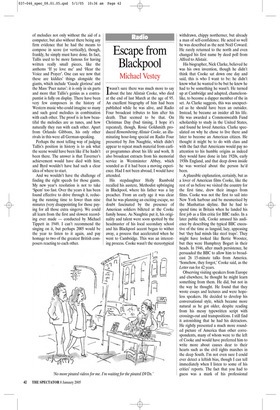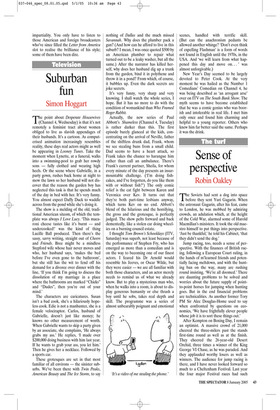Escape from Blackpool
Michael Vestey
Iwasn’t sure there was much more to say about the late Alistair Cooke, who died at the end of last March at the age of 95. An excellent biography of him had been published while he was alive, and Radio Four broadcast tributes to him after his death. That seemed to be that. On Christmas Day (bad timing, I hope it’s repeated), though, Rosie Goldsmith produced Remembering Alistair Cooke, an illuminating hour-long special on Radio Four presented by Jim Naughtie, which didn’t appear to repeat much material from earlier programmes about his life and work. It also broadcast extracts from his memorial service in Westminster Abbey, which sounded as if it had been a moving experience. Had I not been abroad, I would have attended.
His stepdaughter Holly Rumbold recalled his austere, Methodist upbringing in Blackpool, where his father was a lay preacher. From an early age it was clear that he was planning an exciting escape, no doubt fascinated by the presence of American soldiers billeted at the Cooke family house. As Naughtie put it, his originality and talent were soon spotted by the headmaster of his local secondary school and his Blackpool accent began to wither away, a process that accelerated when he went to Cambridge. This was an interesting process. Cooke wasn’t the stereotypical withdrawn, chippy northerner, but already a man of self-confidence. He acted so well he was described as the next Noël Coward. He rarely returned to the north and even changed his first name by deed poll from Alfred to Alistair.
His biographer, Nick Clarke, believed he was his own invention, though he didn’t think that Cooke sat down one day and said, this is who I want to be: he didn’t know what he wanted to be but he knew he had to be something he wasn’t. He turned up at Cambridge and adapted, chameleonlike, to become a dapper member of the in set. As Clarke suggests, this was unexpected as he should have been an outsider. Instead, he became an insider all his life. He was awarded a Commonwealth Fund scholarship to study in the United States, and found he loved America. Clarke speculated on why he chose to live there and later to become an American citizen. He thought it might be to do with class and with the fact that Americans would pay no attention to his humble origins as indeed they would have done in late 1920s, early 1930s England, and that deep down inside he was worried about the person he’d been.
A plausible explanation, certainly, but as a lover of American films Cooke, like the rest of us before we visited the country for the first time, drew their images from films. Cooke was not the first to sail into New York harbour and be mesmerised by the Manhattan skyline. But he had to spend time in Britain when he landed his first job as a film critic for BBC radio. In a later public talk, Cooke amused his audience by describing the typical BBC executive of the time as languid, lazy, appeasing but ‘they had minds like steel traps’. They might have looked like Bertie Wooster, but they were Humphrey Bogart in their heads. In 1946, after much persistence, he persuaded the BBC to allow him to broadcast 26 15-minute talks from America. ‘Somehow, they forgot,’ Cooke said, as the Letter ran for 42 years.
Observing visiting speakers from Europe and elsewhere, he thought he might learn something from them. He did, but not in the way he thought. He found that they wrote essays and lectures and were hopeless speakers. He decided to develop his conversational style, which became more natural as he got older, despite reading from his messy typewritten script with crossings-out and transpositions. I still find it astonishing that he had his detractors. He rightly presented a much more rounded picture of America than other correspondents, many of whom were to the left of Cooke and would have preferred him to write more about causes dear to their hearts such as the civil rights marches in the deep South. I’m not even sure I could ever detect a leftish bias, though I can tell immediately when I listen to some of his critics’ reports. The fact that you had to guess was a mark of his professional impartiality. You only have to listen to those American and foreign broadcasters who’ve since filled the Letter from America slot to realise the brilliance of his style; some of them have been dire.











































 Previous page
Previous page